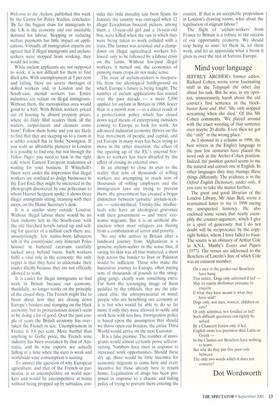Mind your language
JEFFREY ARCHER's former editor, Richard Cohen, wrote some fascinating stuff in the Telegraph the other day about his task. But he was, in my opinion, unnecessarily harsh about the old convict's first sentence in the blockbuster Kane and Abel: 'She only stopped screaming when she died.' Of this Mr Cohen comments, 'We played around with the exact wording of that sentence over maybe 20 drafts. Even then we got the "only" in the wrong place.'
As I showed in a column in 1998, the best writers in the English language in the past few centuries have placed the word only in the Archer-Cohen position. Indeed, the position quoted seems to me the natural and correct one in English. In other languages they may manage these things differently. The evidence is in the Oxford English Dictionary, under only, if you care to take the matter further.
The great and good librarian of the London Library, Mr Alan Bell, wrote a tearstained letter to me in 1998 rueing my unexpected leniency. He also enclosed some verses that neatly exemplify the counter-argument, which I give in a spirit of generosity that I do not doubt will be reciprocated by the copyright holder, whom I have failed to trace. The source is an obituary of Arthur Cole in A.N.L. Munby's Essays and Papers (1977). The verses are addressed to the Benchers of Lincoln's Inn, of which Cole was an eminent member:
On a tree in the garden our Benchers have hung
This notice, 'Dogs only admitted if led' — May an equity draftsman presume to enquire If what they have meant is what they have said?
Dogs only, not men, women, children or cats?
Or only admitted, not fondled or fed? Such difficult questions can rightly be solved By a Chancery Junior only if led.
English owns less precision than Latin or Greek—
In the Classics our Benchers have nothing to learn;
But why do they put this poor only between
The only two words which it does not concern?
Dot Wordsworth


































































 Previous page
Previous page